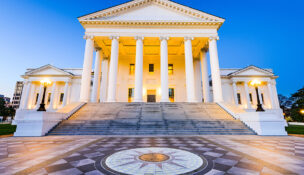Roanoke College poll sees Cuccinelli with a lead but finds many voters undecided
Roanoke College poll sees Cuccinelli with a lead but finds many voters undecided
Republican Ken Cuccinelli holds a seven-point lead over Democrat Terry McAuliffe in the Virginia gubernatorial race, but more than a quarter of registered voters are undecided, according to The Roanoke College Poll.
The poll interviewed 525 registered voters in Virginia between July 8-14 and has a margin of error of plus or minus 4.3 percent.
“The political landscape is beginning to clear as voters learn more about the candidates,” Harry Wilson, director of the Institute for Policy and Opinion Research at Roanoke College, said in a statement. “Both candidates are now viewed favorably, although there are many voters who don’t know much about them. Given the lack of attention being paid to the campaign, that is not surprising.”
The results showed Cuccinelli, Virginia’s attorney general, leading McAuliffe, a former chairman of the Democratic National Committee, by 37 percent to 31 percent. Libertarian candidate Robert Sarvis claimed 5 percent of respondents.
Nonetheless, 27 percent of respondents have yet to pick a candidate in the governor’s race.
Almost two-thirds (62 percent) of respondents said they have thought only a little or not at all about the gubernatorial campaign thus far, while 36 percent said they have given the election some or a lot of thought.
Other statewide races are statistical ties. In the lieutenant governor contest, 30 percent of respondents favored Democrat Ralph Northam while 28 were for Republican E. W. Jackson and 41 percent were undecided.
Republican Mark Obenshain and Democrat Mark Herring also are neck-and-neck in the attorney general race (Obenshain-33 percent, Herring-29 percent, undecided-38 percent).
A plurality of respondents said they did not know enough about McAuliffe (45 percent) to have an opinion about him, and 34 percent don’t have an opinion of Cuccinelli.
Cuccinelli has improved his favorable/unfavorable split (33 percent/26 percent), compared with the April Roanoke College Poll, while McAuliffe has more than doubled his favorable views (24 percent/20 percent).
The most important issues in the campaign cited by voters were unemployment (24 percent) and the economy (20 percent). The only other issues to be named by more than 5 percent of the registered voters were transportation (12 percent) and education (8 percent). It is not surprising, then, that a majority of respondents (61 percent) said a candidate’s economic positions were more important in determining their vote than positions on social issues (17 percent).
Stories about gifts received by the family of Gov. McDonnell from Star Scientific CEO Jonnie Williams Jr. so far do not appear to be a significant factor in the election.
Sixty percent of respondents said they have not been following the controversy closely at all. Only 9 percent said they have been following closely, and 25 percent said they have been following it somewhat closely.
McDonnell’s rating actually has risen marginally since April, from 44 percent to 46 percent favorable, according to the poll. Those numbers, however, do not agree with a results of a another survey released Wednesday by Quinnipiac University. That poll found McDonnell’s approval rating has dropped from 53 percent in March to 46 percent in July.
i


















